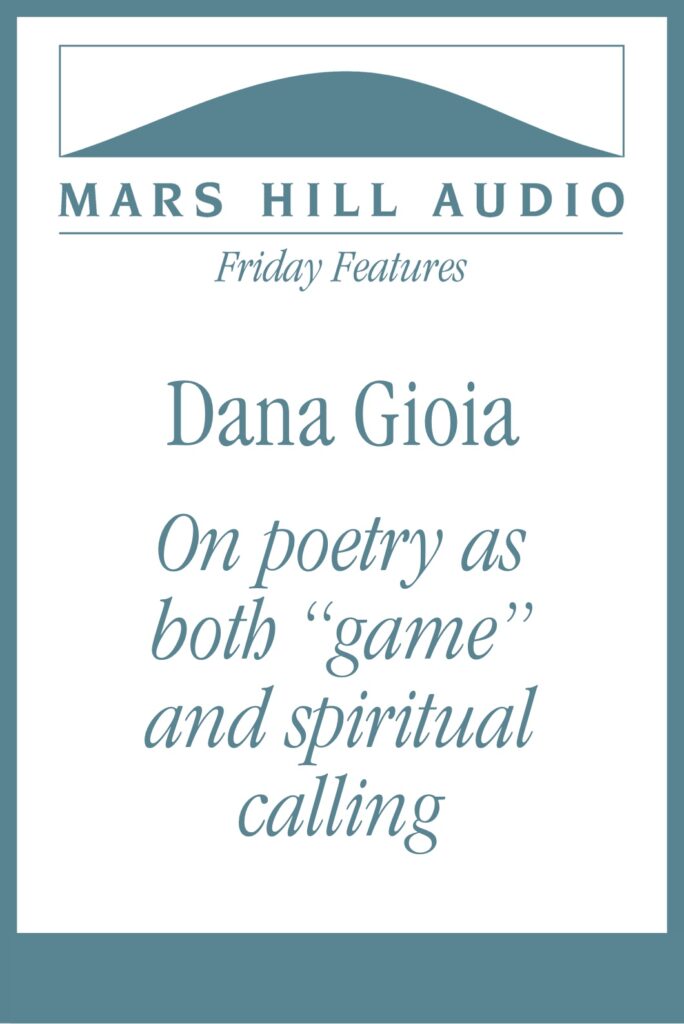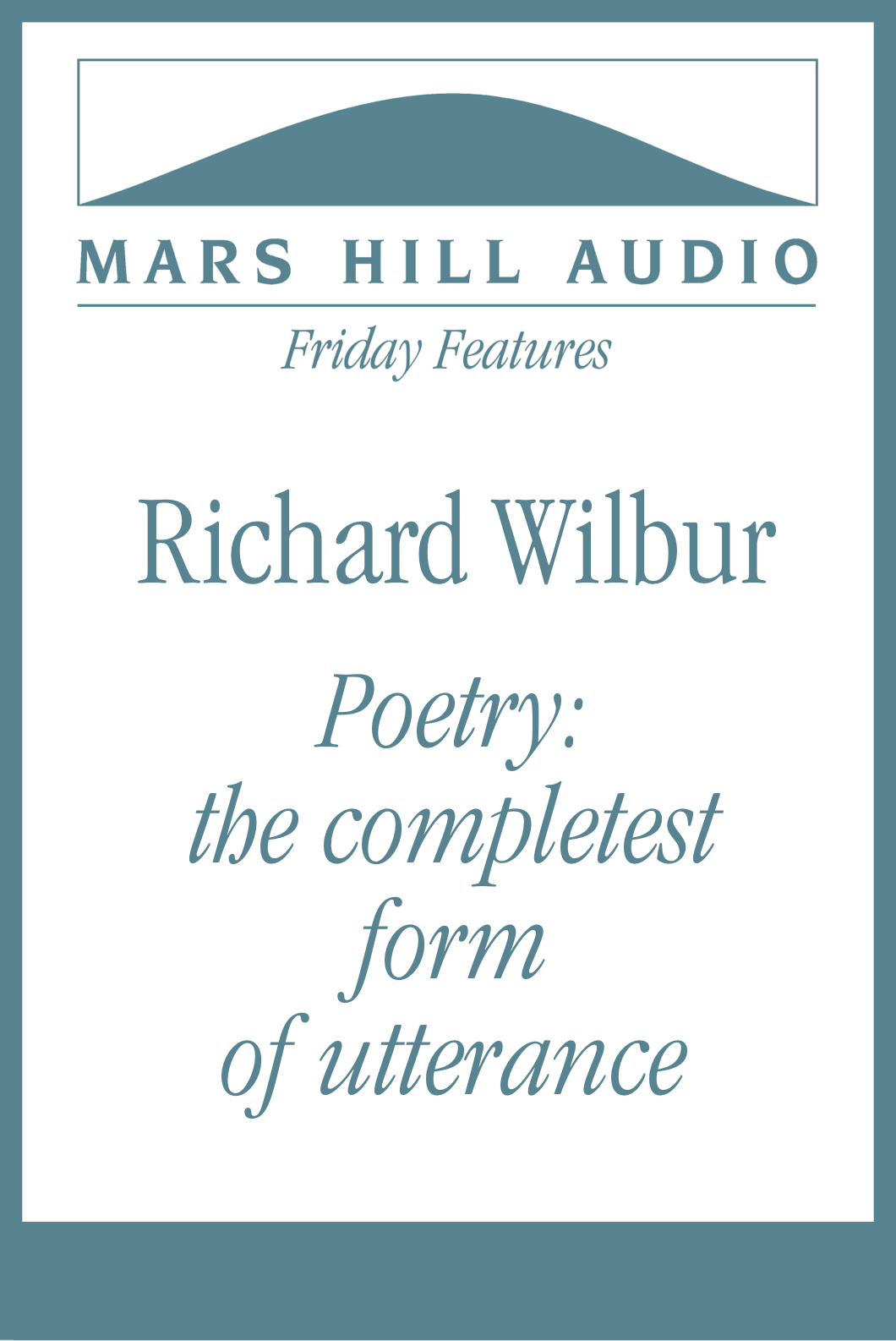
released 9/6/2019
Poet and essayist Dana Gioia has been a welcome guest on the Journal since our first conversation with him in 2001. This Friday Feature presents excerpts from each of those instructive and (in the richest sense of the word) entertaining interviews, including comments on Henry Wadsworth Longfellow, John Donne, and Gerard Manley Hopkins. Gioia’s latest collection of essays is The Catholic Writer Today (Wiseblood).
25 minutes
PREVIEW
The full-length track for this audio is only available to paid members and to listeners with a free Visitor’s Pass. If you are a member, log in here. If you would like a Visitor’s Pass, sign in here. You may purchase one of our complete memberships here. Happy listening!
More to hear . . .
In 2000, Ken Myers enjoyed an hour-long conversation with poet Richard Wilbur. He had just published a collection of new poems called Mayflies. Wilbur — who died in 2017 — received the Pulitzer Prize for poetry on two occasions, and, in the late 1980s, served as Poet Laureate of the United States, succeeding Robert Penn Warren. This Friday Feature honors National Poetry Month (and poetry itself) by remembering one of the greatest American poets.
This feature is available to listeners with a Mars Hill Audio membership.
Related reading and listening
- Poetry and Liturgy — Karen Dieleman explores the influence of liturgical practices on shaping the imaginations and poetry of Elizabeth Barrett Browning, Christina Rossetti, and Adelaide Proctor. (49 minutes)
- Sacramental Poetics — Poet and Eastern Orthodox believer Scott Cairns explains how a good poem functions like an icon: it assists the process of our becoming aware of what is real, and it is generative in the ways it keeps opening up new understandings. (56 minutes)
- Poetry and piety —
FROM VOL. 48 James Trott discusses insights he learned while editing A Sacrifice of Praise: An Anthology of Christian Poetry in English from Caedman to the Mid-Twentieth Century. (7 minutes) - A poet’s relationship to time —
FROM VOL. 57 Poet Wilmer Mills (1969–2011) discusses how his agricultural and cross-cultural childhood in Brazil shaped his imagination and his relationship with modernity. (11 minutes) - The life of the city in poetry —
FROM VOL. 1 Ken Myers talks with W. H. Auden’s biographer and literary executor, Edward Mendelson, about political and social themes in Auden’s poetry. (7 minutes) - Joy & sorrow, destitution & abundance — In this poetry reading and talk, poet Christian Wiman discusses his own faith journey and how his struggles worked themselves into his poems. (40 minutes)
- Seeing Creation Anew: The Life & Poetry of Gerard Manley Hopkins — Dana Gioia examines Gerard Manley Hopkins‘s poetic genius and dedication to Christ in spite of his personal trials and difficult cultural context. (55 minutes)
- “The essence of a moment, clearly perceived” — Haiku poet Gary Hotham reads his poetry and discusses how the form of haiku reveals the connection between creatures and creation. (45 minutes)
- The joy and mystery of poetry —
FROM VOL. 98 Jeanne Murray Walker discusses how she helps students approach and appreciate poetry as the mysteriously meaningful literature it is, rather than as a linguistic cage containing static meaning to be abstracted from the words of the poem. (23 minutes) - The primacy of imagination —
FROM VOL. 51 Literary critic Roger Lundin situates William Blake as a descendant of the radical Protestant movement of the 17th century and as a forerunner of the late 19th and early 20th century movements that put theology and the human spirit in opposition to the natural, fragmented, fallen world. (11 minutes) - Dickinson and modern malaise —
FROM VOL. 36 Roger Lundin explains how Emily Dickinson’s understanding of love, nature, religion, and mortality are modern in content. (11 minutes) - The idiom for the revelation of mystery — Dana Gioia on the foundational place of poetry in Christian faith
- Breaking the frozen sea — Dana Gioia on how poetry enchants
- Seneca’s moral courage — Dana Gioia explains how Seneca’s family was interwoven with the Roman governing class, ultimately leading to the philospher’s death at the hands of Emperor Nero. (27 minutes)
- John Donne’s Passion in Life, Faith, & Verse — Poet Dana Gioia discusses the remarkable life of poet John Donne and how his spiritual and intellectual struggles created the conditions for his unique poetic voice. (53 minutes)
- The importance of literary reading —
FROM VOL. 70 Dana Gioia discusses the important role literary reading plays in society and the 2004 publication from the NEA about such reading. (13 minutes) - Longfellow’s appeal —
FROM VOL. 53 Poet and critic Dana Gioia explains why Henry Wadsworth Longfellow (1807-1882) is one of the three great American poets. (30 minutes) - Sacramental correspondence —
FROM VOL. 51 Poet Dana Gioia discusses the state of contemporary poetry and the sacramental relationship between language and reality. (15 minutes) - Mars Hill Audio Journal, Volume 164 — FEATURED GUESTS: Dana Gioia, Brady Stiller, Robert Royal, Richard DeClue, Tiffany Schubert, and Joonas Sildre
- “A sign of contradiction” — In this lecture, Daniel Gibbons compares and contrasts understandings of sacramental poetics proposed by Augustine, Aquinas, and Sydney. (36 minutes)
- Education as a pilgrimage and a mystery — In this lecture, James Matthew Wilson gives a compelling argument for understanding the role of a literary or poetic education as an immersion of the whole being in truth and beauty. (43 minutes)
- “Prophet of holiness” — Timothy Larsen discusses a new edition of George MacDonald‘s Diary of An Old Soul, a slim book of poem-prayers to be read daily as a devotional aid. (30 minutes)
- Touch’d with a coal from heav’n — Daniel Ritchie finds in the poetry of William Cowper (1731–1800) an anticipation of Michael Polanyi’s epistemology
- How we know the world — Daniel Ritchie argues that poet and hymnodist William Cowper was ahead of his time in critiquing the Enlightenment’s reductionist view of knowledge. (16 minutes)
- William Cowper: Reconciling the Heart with the Head — Daniel E. Ritchie discusses the life and work of poet William Cowper (1731–1800), comparing his commitment to understanding reality through personal knowledge, intuition, and rigorous contemplation with the thought of Michael Polanyi. (43 minutes)
- Bearing witness through poetry — Roger Lundin discusses the incarnational witness of poet Czesław Miłosz (1911–2004), exploring his service to truth and to his native tongue, Polish. (16 minutes)
- Czesław Miłosz: A Poet of Luminous Things — Roger Lundin discusses the themes, breadth, and depth of poet Czesław Miłosz‘s work, explaining how Milosz incarnated in his life and work a sense of exile and alienation so common to modern man. (43 minutes)
- Soundings of the human soul — Professor John H. Timmerman discusses the poetry of the late Jane Kenyon (1947-1995) and his visit to her home, Eagle Pond Farm. (16 minutes)
- Jane Kenyon: Living and Dying at Eagle Pond Farm — Biographer John H. Timmerman discusses the life and work of poet Jane Kenyon (1947–1995). (53 minutes)
- The formative power of hymns and hymnbooks —
FROM VOL. 149 Christopher Phillips discusses the cultural and spiritual effects of hymns and the “thingness” of hymnals. (18 minutes) - The rediscovery of meaning — Poet and theologian Malcolm Guite explains Owen Barfield’s idea of the development of consciousness over time, an evolution made evident through language that reveals an earlier, pre-modern way of seeing the world. (63 minutes)
- Gioia, Dana — FROM THE GUEST PAGE: Dana Gioia is the former Poet Laureate of California. An internationally recognized poet and critic, he is the author of six collections of verse.
- The rich significance of everyday life — In this interview from 2000, Roger Lundin — a frequent guest on our Journal — explains how the poetry of Richer Wilbur connects with the verse of other New England poets. (24 minutes)
- The desires of the heart, the constraints of creation — Roger Lundin describes how Richard Wilbur’s poetry connects aesthetic experience to life in the world.
- Mars Hill Audio Journal, Volume 159 — FEATURED GUESTS: Kirk Farney, Andrew Willard Jones, James L. Nolan, Jr., Andrew Kaethler, Peter Ramey, and Kathryn Wehr
- All manner of thing shall be well — T. S. Eliot’s Four Quartets is regarded by many as his greatest accomplishment. Today’s Feature presents a lecture about this monumental work, a talk given in 2019 by Dr. Janice Brown. (58 minutes)
- Insights into reality itself — Malcolm Guite on the philosophical concerns underlying Coleridge’s The Rime of the Ancient Mariner
- The story of the demotion of stories — Malcolm Guite on the Enlightenment’s rash dismissal of poetic knowledge
- Feelings made articulate — Glenn C. Arbery on poetry and the intelligibility of the inner life
- Words as fulcrums — Wendell Berry on the mediating responsibilities of poets
- Richard Wilbur: R.I.P. — Poet Richard Wilbur (1921–2017) describes how poetry is at once profoundly private and yet essentially public. Poetry — like love — calls us to the things of this world. (44 minutes)
- From cities humming with a restless crowd — In a much-sung hymn and a little-known poem, William Cowper seeks retirement from worldliness
- A very figurative and metaphorical God — David Lyle Jeffrey on the poetic character of the voice of God
- Mars Hill Audio Journal, Volume 149 — FEATURED GUESTS: Dru Johnson, Steven L. Porter, Reinhard Hütter, Matthew Levering, David Lyle Jeffrey, and Christopher Phillips
- Walter Hooper, R.I.P., and Christina Rossetti’s Advent poems — Walter Hooper (1931-2020) describes his first meeting with C. S. Lewis, a man he so admired and long served. In a second chapter in today’s Feature, Emma Mason explains how Christina Rossetti’s hopeful eschatological beliefs influenced the poems she wrote about the season of Advent. (21 minutes)
- Music for St. Cecilia’s Day — Ken Myers introduces several poems and related musical compositions that celebrate the heavenly gift of music and thereby honor St. Cecilia. (21 minutes)
- Spirits in Bondage: Lewis’s early poetry — Karen Swallow Prior and Don W. King discuss C. S. Lewis’s early poetry and the evidence therein of a “frustrated dualism.” (23 minutes)
- On reading and “Englishing” Dante — Jason Baxter, Rod Dreher, and Robert Pinsky discuss the age-old appeal and power of Dante Alighieri’s Divine Comedy to awaken our souls to Divine beauty. (25 minutes)
- Six recent books worthy of note — Ken Myers shares a summary of six recent books that we want our listeners to know about but whose authors we won’t be interviewing. (15 minutes)
- Mary Midgley, R.I.P. — Philosopher Mary Midgley (1919–2018) was a tireless critic of the reductionist, atomistic claims of modern science. (16 minutes)
